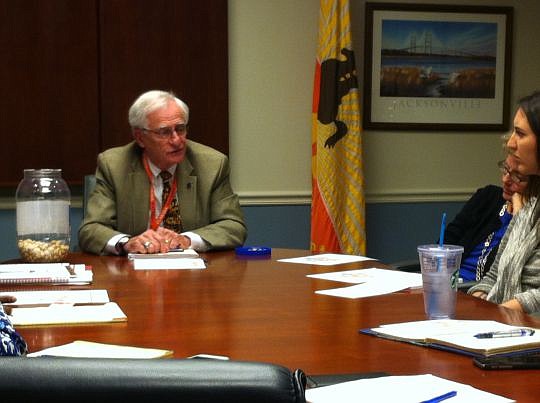
Jacksonville has lots of empty houses. And lots of people who need housing.
The challenge is to bring the two together.
Calling it the “most important issue in the community right now,” City Council member Bill Gulliford led a discussion Tuesday on how the city might take over blighted houses and support affordable housing in Jacksonville’s weaker neighborhoods.
Drive through several Jacksonville neighborhoods and blight can be easily seen. In October, blight got a map.
The Jessie Ball duPont Fund paid for a block-by-block analysis of Jacksonville’s housing markets. Weaker, blighted areas showed up red.
Other cities have used similar studies to target weak neighborhoods for proactive code enforcement and reinvestment. Now Gulliford wants the study to help Jacksonville do the same.
Joining him in the conversation were council members Anna Lopez Brosche and Garrett Dennis and mayor’s office representative Ali Korman Shelton.
There wasn’t a proposal on the table. But Gulliford asked the group to think about what kind of entity could best be used to “receive and dispose of” abandoned blighted properties.
How would it function? How could we encourage it? And, how would it become a conduit for repurposing property, he asked.
Gulliford has been a longtime proponent of a land bank — a program in which a city takes title to abandoned homes and finds developers to revitalize them.
But where land banks have succeeded, in Milwaukee for example, states heavily supported them. In Florida, there’s no such funding.
“It’s going to take a significant amount of money,” Gulliford said. And, whoever takes ownership will have to take over maintenance while wading through Florida’s three-year foreclosure process.
Another question is whether the program would be run by the city housing department, an independent authority or a nonprofit.
If through a nonprofit, the city would still need to condemn the property, creating an issue as to how it could then be transferred to the nonprofit.
If through the city’s own housing department, it would be harder to depoliticize the process.
Baltimore, for example, used its housing department to reclaim blighted neighborhoods. But officials there admitted a new mayor could send that program down a different track.
Whatever method is used, Gulliford hopes to pair it with an affordable housing-community redevelopment initiative.
He predicted it would take a long-term monumental effort. Without it though, parts of the city would deteriorate into places no one wants to drive through.
“There’s no physical barrier between bad neighborhoods and good neighborhoods,” Gulliford said. “Bad people in bad neighborhoods can easily move criminal activity into a good neighborhood. … And, Riverside is awful doggone close to Durkeeville.”
(904) 356-2466